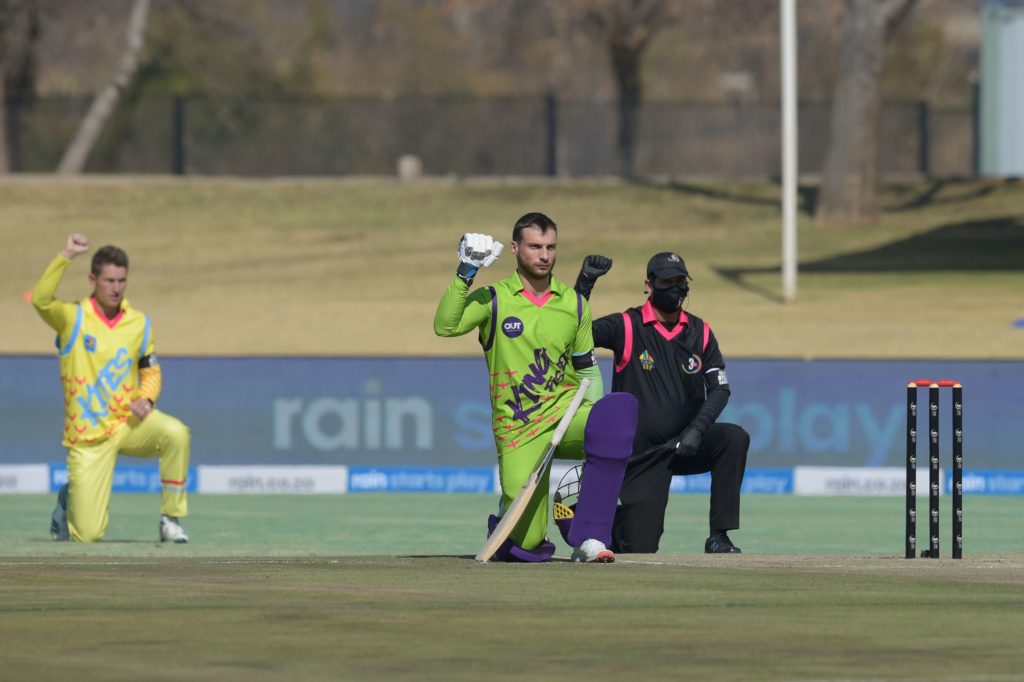Kneeling in solidarity with the Black Lives Matter movement has gone out of fashion in cricket and it’s a shame, writes RYAN VREDE, hoping the Proteas don’t disregard its symbolic importance when they resume playing.
I listened to West Indies captain Jason Holder’s address to the Cricket Writers’ Club yesterday with keen interest. He spoke about how disheartened he is that kneeling prior to the start of matches had stopped after Australia’s tour of England earlier this year. Michael Holding, who spoke powerfully and insightfully on the issue during the West Indies tour, has subsequently condemned the England, Pakistan and Australia boards for their poor handling of it.
Holder lamented how difficult it is to get people to see the importance of kneeling: ‘…and that’s where the education has to be filtered through,’ he said.
‘It’s really important people understand where we as black people are coming from, and understand the harsh reality of how the world is set up. There are inequalities out there, some of them are very much in our faces, some are done discretely, but there are inequalities and I think it’s just a level of education.
‘I personally was a bit disappointed to see how the Pakistan and Australia tours went on after us and they’re not showing their solidarity. But it’s a long debate, a long hard challenge, a long road, we as people need to continue to come together, put our minds together and genuinely find ways to fix the inequalities in the world.
‘It’s not an overnight fix, this is something that is going to be ongoing for maybe a number of years. But I think the most important thing is that we need to come together, we need to see each other as all equal human beings and treat each other that way, and be your brother’s keeper in this world.’
I feel their pain and frustration.
I’d understand if teams and their boards – especially those from predominantly white countries – had moved from the act of showing solidarity with #BLM through kneeling, to implementing sustainable strategies to tackle the inequalities that the movement seeks to highlight and eradicate.
But I’ve yet to be made aware of a significant strategy to achieve this. There was a heightened awareness of this issue for a short period, some white players spoke publicly about how their privilege had been illuminated through stories of their black peers’ lived experience, and some teams held ‘culture’ camps, which are a start.
Beyond that, what?
The players, especially the world’s elite, must lead on this issue. They can’t leave it to their boards. Those who love the game aren’t influenced by boards. They are impacted by the words and actions of their sports heroes. This is especially true for young kids.
The symbolism of kneeling is powerful. It has become synonymous with the rejection of oppression in any form and the determined drive for equality. There is no ambiguity in the meaning, which makes it extremely impactful and, even just for a couple of seconds, it reminds those watching that there are still people who are oppressed because of the colour of their skin – despite us being in 2020.
But it hasn’t progressed beyond the symbolism, and now it’s done. It’s a trend that has seemingly run its course, when it should have progressed to something that seeks to correct the experience of the oppressed today, and ensure that the future is characterised by greater levels of equality – particularly equality of opportunity.
With the cricketing world’s attention trained on the Indian Premier League, organisers and players have missed the chance to continue making a powerful statement through kneeling. I’m not in favour of forcing anyone to kneel, but the opportunity should exist for those who choose to do so.
Hopefully this is the case if England tour South Africa in November and December. The Proteas have an opportunity to lead on this issue of immense importance. Considering the country’s history of racial oppression and the lasting effects thereof, I hope they take that opportunity.







